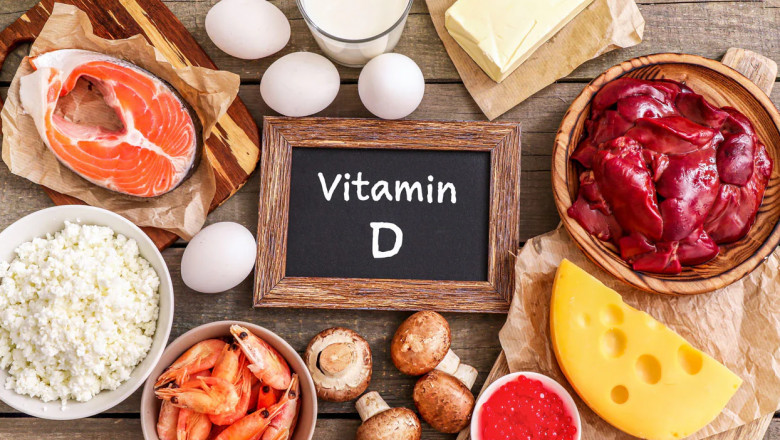views

Vitamin D is often called the “sunshine vitamin,” but what if we told you that millions of people are dangerously low on it—and they don’t even know it? The truth about vitamin D goes far beyond bone health. From boosting your immunity to fighting depression, this powerhouse vitamin plays a vital role in your overall well-being.
Let’s uncover the shocking truths about vitamin D—how it affects your body, why deficiency is more common than you think, and what you can do about it.
☠️ 1. Vitamin D Deficiency Is a Global Epidemic
Here’s the shocker: Even in sunny countries, vitamin D deficiency is extremely common. According to health studies, over 1 billion people worldwide have low vitamin D levels.
Why?
-
We spend more time indoors than ever before.
-
Sunscreen blocks vitamin D synthesis.
-
People with darker skin produce less vitamin D from sunlight.
-
Aging reduces the skin’s ability to produce vitamin D.
🛡️ 2. It’s Not Just About Bones
Most people associate vitamin D with calcium and bone health—but that’s just the beginning.
Vitamin D also:
-
Boosts your immune system
-
Supports heart health
-
Improves mood and fights depression
-
Helps with weight management
-
Reduces inflammation and chronic pain
Low levels have been linked to:
-
Increased risk of autoimmune diseases
-
Diabetes
-
Heart disease
-
Cognitive decline and Alzheimer’s
🧠 3. It Impacts Mental Health More Than You Think
Here’s something many don’t know: Vitamin D plays a role in brain function and mood regulation.
Low vitamin D levels have been linked to:
-
Seasonal Affective Disorder (SAD)
-
Anxiety and irritability
-
Depression symptoms
-
Brain fog and poor focus
If you constantly feel tired, down, or unmotivated—your vitamin D level might be part of the reason.
💊 4. You Might Not Be Getting Enough from Food
Unlike other vitamins, vitamin D isn’t naturally found in many foods. Even with a healthy diet, it’s hard to meet your daily needs through food alone.
Limited food sources include:
-
Fatty fish (salmon, sardines, mackerel)
-
Fortified dairy or plant-based milk
-
Eggs (yolk)
-
Fortified cereals
That’s why sunlight exposure or supplementation is often necessary.
🧬 5. It Affects Your Genes
Vitamin D doesn’t just float around your bloodstream—it actually interacts with over 2,000 genes in your body, influencing how your cells function.
That means it’s connected to everything from immune response to DNA repair. When your vitamin D is low, your body may not be operating at its best cellular level.
🩺 6. Most People Don’t Know They’re Deficient
Vitamin D deficiency often has silent symptoms like:
-
Fatigue
-
Joint or bone pain
-
Muscle weakness
-
Low immunity
-
Mood changes
Because these signs are subtle and easily confused with other issues, many people go years without knowing they’re deficient.
👉 A simple blood test (25-hydroxy vitamin D) can reveal your level.
🌞 7. A Few Minutes in the Sun Might Not Be Enough
You might think a daily walk in the sun is enough—but it's not that simple.
Factors that reduce vitamin D synthesis:
-
Wearing sunscreen (even SPF 15 blocks 93% of D production)
-
Time of day (early morning or late afternoon sun isn’t strong enough)
-
Skin tone (darker skin needs more sun exposure)
-
Cloudy weather or pollution
-
Being indoors or behind glass
In winter, most people in northern regions can’t make enough vitamin D from sunlight alone.
💊 8. Supplementing Isn’t One-Size-Fits-All
Vitamin D supplements come in different forms (D2 and D3), and dosage matters.
-
D3 (cholecalciferol) is more effective than D2
-
Common doses range from 1,000 IU to 5,000 IU daily
-
You may need higher doses if you're deficient—under medical supervision
⚠️ Taking too much can lead to toxicity (though it’s rare), so don’t mega-dose without checking your blood levels.
✅ What You Can Do
1. Get tested – Ask your doctor for a 25(OH)D test.
2. Spend smart time in the sun – Aim for 10–20 minutes of direct sunlight on skin (without sunscreen).
3. Eat vitamin D-rich foods – Include fatty fish, fortified milk, eggs.
4. Consider a supplement – Especially in winter or if you’re indoors often.
5. Pair it with vitamin K2 and magnesium – For better absorption and bone health.
🌟 Final Thoughts
The truth about vitamin D is clear: it’s essential, powerful, and too often overlooked. Don’t wait for symptoms to show up. Be proactive, get tested, and make vitamin D part of your wellness routine.
Your body and mind will thank you.



![TrimIQ [Weight Loss Powder] – Why Nutritionists Are Recommending This Over Pills?](https://theconnectly.com/upload/media/posts/2025-06/13/trimiq-weight-loss-powder-why-nutritionists-are-recommending-this-over-pills_1749819087-s.jpg)








Comments
0 comment